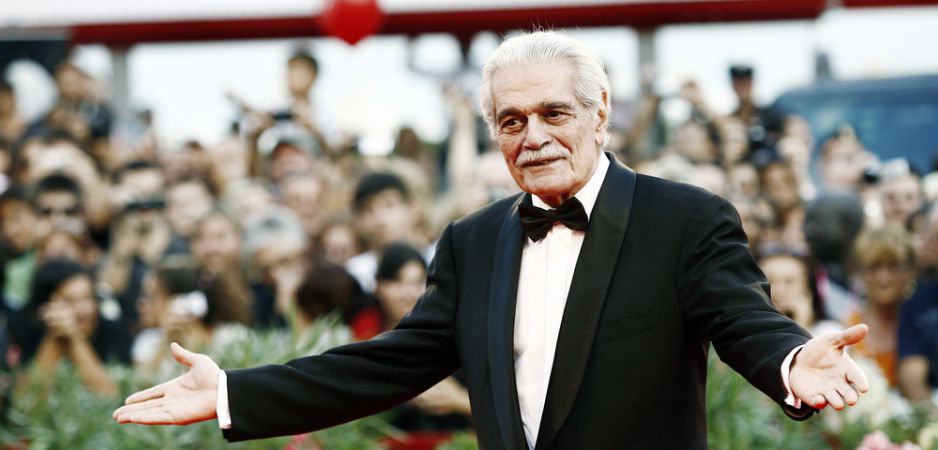Egyptian actor Omar Sharif was a citizen of the world, someone who crossed cultural boundaries with apparent ease.
Omar Sharif has died at 83. Born as Michel Chalhoub in Alexandria to Lebanese Christian parents in 1932, he changed his name and converted to Islam in 1955 in order to marry his co-star, Faten Hamama.
The two were a power couple in the Cairo film world of the 1950s, a time of Egyptian nationalism and a growing experiment with socialism under President Gamal Abdel Nasser. It was a more secular time, when few urban Egyptian women veiled, and the feminist movement had successes.
Sharif was catapulted into world-wide fame because, in 1962, director David Lean cast him in the role of Sharif Ali in Lawrence of Arabia.
He later worked again with Lean in the 1965 Doctor Zhivago, based on the novel by Boris Pasternak. In 1968, having already played a range of characters from Genghis Khan to a German military officer, Sharif was cast as Nicky Arnstein opposite Barbra Streisand in Funny Girl.
The Egyptian government banned the film and was allegedly angry about his playing a Jewish character (the film came out a year after the 1967 war). For his part, he fell in love with Streisand.
Barbra Streisand is said to have quipped that if you thought the Egyptian government was upset, you should have seen the letter she got from her Aunt Rose.
(Faten Hamama and he became estranged after he became a global star and pursued other conquests, something he later regretted; she was the only woman he ever married. She died in January 2015, but by that time, Sharif’s Alzheimer’s was so advanced that when he was informed, he no longer recognized her name.)
Sharif later played Che Guevara (1969), but in the 1970s, the quality of the roles he was offered declined steeply and he later gave up acting, save for a turn in the 2003 French film Monsieur Ibrahim, about a Parisian Muslim shopkeeper who adopts a Jewish boy. That role won him a Caesar, the French counterpart of Hollywood’s Oscar.
Sharif was a citizen of the world, someone who crossed cultural boundaries with apparent ease. Born Christian, he embraced Islam. Born Egyptian, he was comfortable in Los Angeles and Paris. Having become Muslim, he fell in love with a Jewish co-star.
But what now seems remarkable is the acceptance he gained and the range of roles he was offered by Hollywood in his era of fame.
In the zeroes of this century, Arab-American actors often could not get past being stereotyped as terrorists. Even Lebanese-American Tony Shalhoub, who shares a patronym with Sharif, and who gained fame in the role of the neurotic detective Monk on the USA Cable Network, had to play a terrorist at the beginning of his career. Once, he said, was enough.
It is a little difficult to imagine a major director recruiting a star from Cairo nowadays, or such a star being offered a mainstream lead such as Zhivago. It is not as if the geopolitical tensions are worse now than before. In fact, they have in some ways lessened. Egypt was more or less viewed as an enemy in the mid- to late-1960s by the US government, whereas nowadays it is seen as an ally.
What has changed? I think there is just more general, public prejudice against Arabs and Muslims in the US and Britain today. In the 1960s, people seemed to be able to make a distinction between individuals and nations. Otherwise, the Sharif-Streisand epic romance could never have happened. I don’t think the 9/11 attacks by al-Qaeda explain the sea change. Perhaps it is the long Iraq War, where Arabs were the military enemy every day all day for eight years (and now again with the rise of the “Islamic State”).
What I can say is that in this regard, the 1960s were healthier. They gave us an Arab, Muslim leading man and movie star whom we could adore, no matter who we were. I wish we could get back to that.
*[This article was originally published on Juan Cole’s blog.]
The views expressed in this article are the author’s own and do not necessarily reflect Fair Observer’s editorial policy.
Photo Credit: Andrea Raffin / Shutterstock.com
 We bring you perspectives from around the world. Help us to inform and educate. Your donation is tax-deductible. Join over 400 people to become a donor or you could choose to be a sponsor.
We bring you perspectives from around the world. Help us to inform and educate. Your donation is tax-deductible. Join over 400 people to become a donor or you could choose to be a sponsor.
Support Fair Observer
We rely on your support for our independence, diversity and quality.
For more than 10 years, Fair Observer has been free, fair and independent. No billionaire owns us, no advertisers control us. We are a reader-supported nonprofit. Unlike many other publications, we keep our content free for readers regardless of where they live or whether they can afford to pay. We have no paywalls and no ads.
In the post-truth era of fake news, echo chambers and filter bubbles, we publish a plurality of perspectives from around the world. Anyone can publish with us, but everyone goes through a rigorous editorial process. So, you get fact-checked, well-reasoned content instead of noise.
We publish 2,500+ voices from 90+ countries. We also conduct education and training programs
on subjects ranging from digital media and journalism to writing and critical thinking. This
doesn’t come cheap. Servers, editors, trainers and web developers cost
money.
Please consider supporting us on a regular basis as a recurring donor or a
sustaining member.
Will you support FO’s journalism?
We rely on your support for our independence, diversity and quality.







Comment